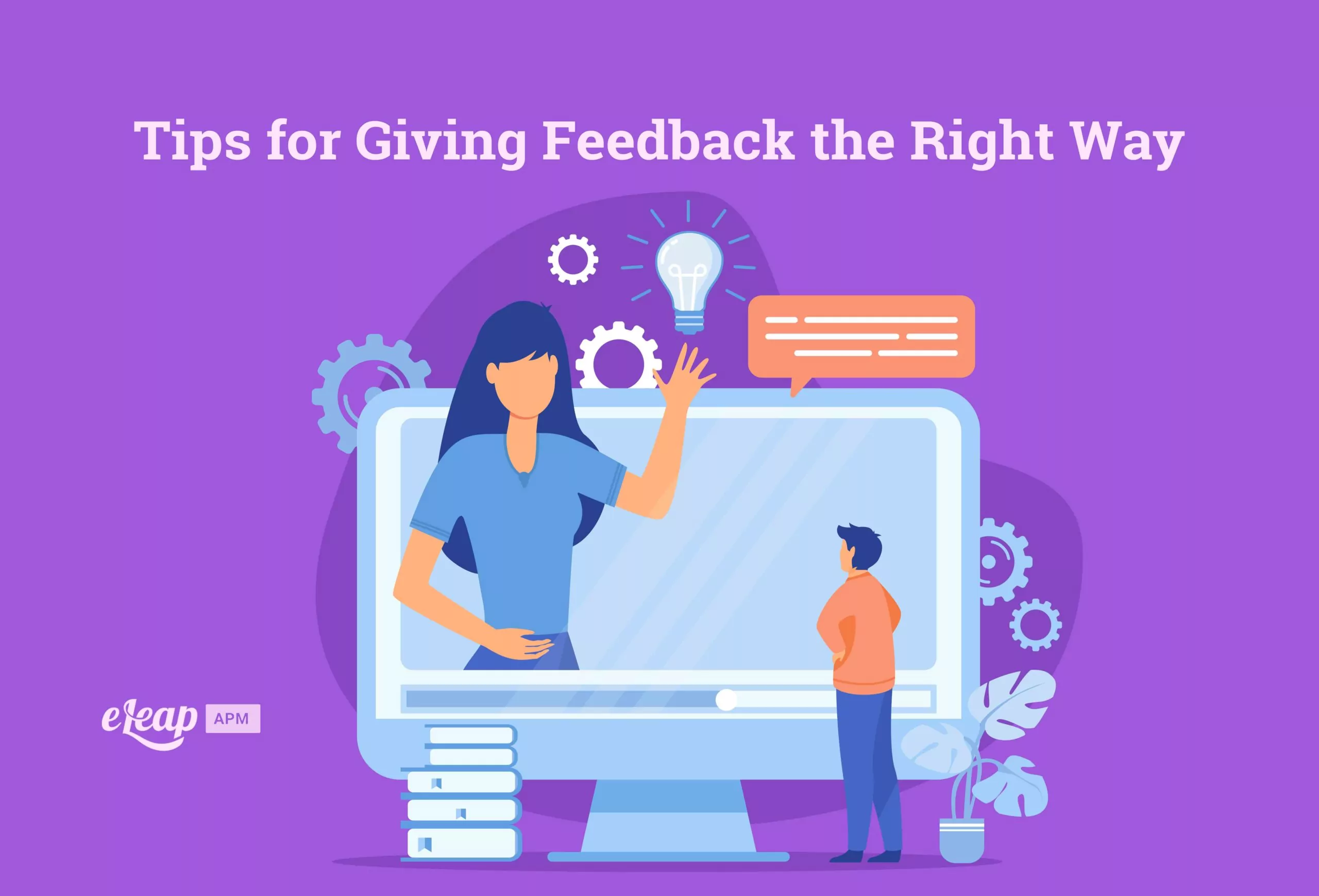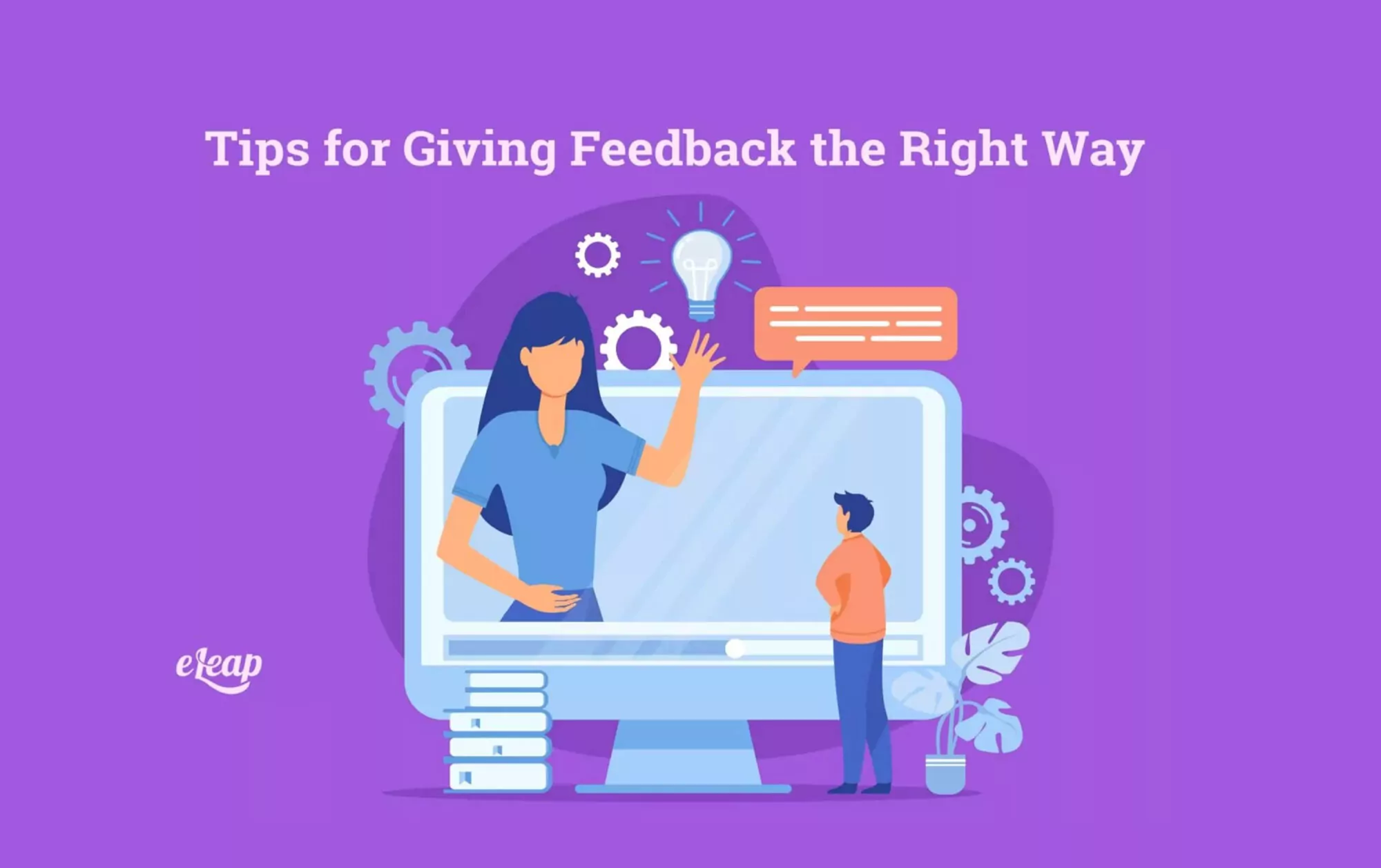Tips for Giving Feedback the Right Way

When you’re giving feedback at work, the common saying rings true. It’s not just what you say but how you say it. Being able to give feedback in a constructive, actionable way is key to being able to make the impact you want to make with your employees. Explore how eLeaP’s Performance Management Platform can simplify evaluations, boost productivity, and drive measurable results.

How do you give feedback in the right way? It may seem complicated, but if you follow the tips we’re about to give you. You’ll be impressed at how much more effective your feedback becomes!
Don’t Give Advice Your Employee Didn’t Ask For
Unfortunately, most of the feedback given in the workplace these days is unsolicited and can cause stress, tension, or even resistance between you and your employee. The best way to avoid this is to allow your employees to request feedback when they want it. Allowing you to know the area of their work they want your opinion on.
Of course, this isn’t always possible. When you need to give feedback to an employee that they haven’t asked for, keep their personality in mind. Know your audience and approach the feedback in that way. Don’t approach the feedback as a laundry list of things you think they should change. Instead, give feedback in a similar way that you manage that employee, allowing them to not feel that they’re being bombarded with advice they don’t want.
Be Specific When Giving Feedback
If you come to your employee and simply let them know that they need to improve their performance in an area, this can come across as vague and not useful. If the feedback you’re giving isn’t specific and actionable. It will likely fall on deaf ears.
If you notice an issue with an employee that needs to be addressed, bring up the specific problem at hand and then what you’d like to do about it with them. So, if they aren’t reaching their sales goal, they should. Let them know that you want to work with them on their conversion skills to help them improve going forward.
When your employees leave a feedback session, they should know exactly what they need to work on and what the game plan is. In place to help them out, you’re more likely to see them putting in the initiative to change.
Use Empathy When Giving Feedback
No one likes to be told that they aren’t meeting expectations in an area of work. This is an important thing to remember before you go into a feedback session, especially if you need to discuss some frustrating patterns with the employee. Before you sit them down, take a moment to put yourself in their shoes. This can help you put your frustrations aside so they don’t affect how you give feedback.
During the feedback session, make sure to give your employees time to express their side of what’s going on. Not only that but really listen to them to let them know you are concerned about their situation as well as the work issue at hand. The truth is, you don’t know everything your employee is going through. And the issue at work may be related to a personal struggle you weren’t aware of.
Empathy doesn’t mean sugarcoating the issue at hand or beating around the bush. However, it involves remembering that your employees are people and have lives outside of work that can sometimes interfere with their performance while on the clock. Don’t come into your feedback sessions with preconceived notions of why the issue is occurring, and you’ll be ready to approach it with empathy.
Don’t Put Off Giving Feedback
While performance reviews are a great time to give overall feedback to your employees, they shouldn’t be the only time you give them feedback. In fact, giving your employees feedback shortly after they perform a task is more likely to have a lasting impact on how they perform at work going forward.
If you think of feedback to give an employee, do it as soon as you can. This doesn’t mean you have to drop everything you’re doing to approach them, but try to do it within a day or so of the event occurring. This can help your employees in a host of ways. If it’s positive feedback, it can help boost morale going forward. If it’s constructive feedback. It can allow you to correct an issue before it gets out of control and is harder to fix.
Plus, the longer you wait to give the feedback you have, the more likely you are to forget about it or at least aspects of it. Giving feedback regularly and promptly can help boost the overall culture of your workplace and will become a habit the more you do it!
Always Give Feedback Privately
There are few things more detrimental to a worker’s morale and confidence than being criticized for something publicly. Feedback sessions are often uncomfortable for both you and the employee receiving the feedback. So it’s best to do it without an added audience. This can help relieve some of the tension of the meeting, allowing you both to approach it more comfortably.
Even when you’re giving positive feedback, it’s often best to do it privately. Some of your employees may be embarrassed about being the center of attention, while other employees may feel left out in the process. There are certain times when public appreciation is appropriate. Such as with awards. But many times, it’s best to do it one on one.
Allow for Dialogue When Giving Feedback
If you speak for the entirety of the feedback session, never giving your employee a chance to respond, you’re not setting the stage for a positive experience. Make sure you’re respecting your employee’s right to respond to what you’re saying to them and give an explanation for why they’re performing the way they are. This can help you better understand what’s going on and can also help you better come up with an action plan moving forward.
You may have a solution in mind, but once you speak to your employee. The two of you may realize a better plan exists. If you don’t allow your employees time to respond, you may not be able to come up with the best plan possible.
Discuss the Situation, Not the Person
When you’re giving feedback, it’s never okay to aim it toward your employee’s personality. Instead, you should focus on the behaviors that your employee is exhibiting that are causing issues. When you focus on a personality trait, it can come across as demeaning or as if you have a problem with your employee specifically. This can cause your employees to shut down or feel like they can’t perform better because of who they are.
However, when you approach the feedback through the situation and behaviors shown, it’s easier for your employee to see actions they can take to change their ways. Plus, it won’t come across as a personal attack, which will allow your working relationship to stay on good terms.
Always Follow Up After Giving Feedback
Once you give feedback to an employee, you may think your job is done. However, that’s not the case! It’s important to touch base with your employees after a feedback session to see how the action plan you discussed is working out.
There are many benefits to following up after a feedback session. First, your employee will see that you truly care about seeing them improve and succeed in their position. Plus, you can get an idea of how the idea is working in the work setting. An idea may look great on paper, but when it’s actually utilized, it may not give the results you expected. With follow-up, you can tweak the plan as needed when you see how your employees have changed since the feedback session.
Keep the Goal In Mind
No matter what kind of feedback you’re giving your employees. Remember that the goal of every feedback session is to help your employees improve. This should motivate every element of the session. If you want to know how your feedback sessions are helping your employees, offer for them to give you feedback on how you approached the situation.
When you receive feedback on your approach. You can see how well your motivations are coming through your actions in a feedback session. This can help you change your approach as needed to make sure you’re giving your employees the tools and suggestions they need to improve in their positions.
Takeaway
Feedback can be an intimidating part of any job. As a manager, it’s your job to give actionable feedback that you can measure through metrics or goals being met. So you can truly know how your employees are performing. Never approach feedback as an attack on an employee’s personality. Instead, come at it with empathy and an open mind on the reason behind the issue and ideas for how to change it moving forward.
Of course, feedback shouldn’t always be negative. There’s a time for positive feedback as well! Just make sure your constructive feedback doesn’t get lost in a mix of positive feedback. To allow it the proper chance to be taken to heart by your employee.